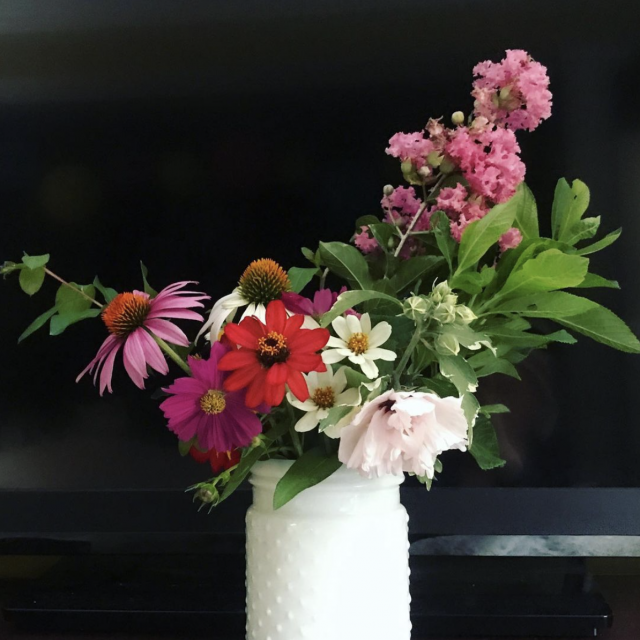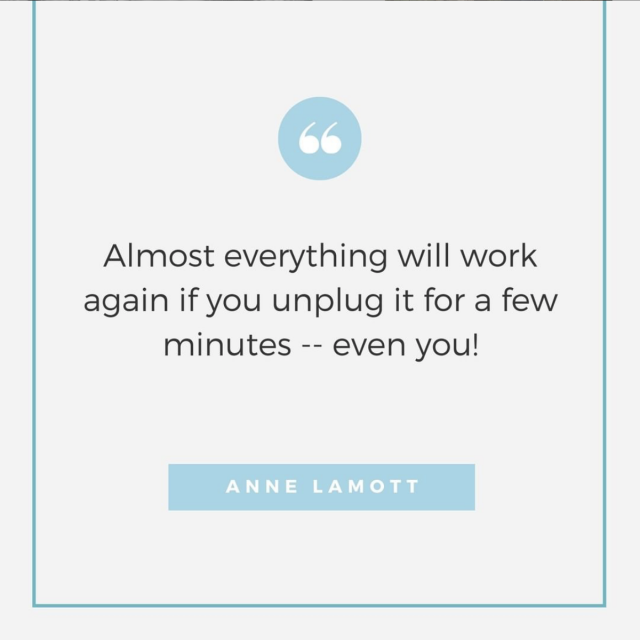Why are we so busy, and what is it about our culture that fuels this busyness? I’ve been thinking about this question on and off since 1985, when I was a college student in Denmark for the summer. I was sitting at a picnic table with five or six other students having lunch. “I have a question for you,” the Danish man said as he sat down with our group. He was in his twenties, eyes merry, relaxed expression. “You Americans, always rushing, always going ‘zip, zip, zip’ — why?”
We laughed at the inanity of the question, and I think there was some good natured back and forth about the pokey pace of the Danish countryside versus the excitement of the American culture of achievement, of places to go, people to see, things to do.
As we rode the bus back to the renovated barn turned learning community for the summer, I rolled my eyes at the strategically located “thinking chairs” placed all around the grounds. How we rolled our eyes at and mocked those thinking chairs, situated on top of hills, nestled at the edge of the woods, hidden in a garden with wind chimes. We never used them, thinking that they were ridiculous. Yet it seemed pretty clear that the Danish man would have loved them.
Why Are We So Busy and Rushed?
It’s become a truism that we are all terribly busy and that we don’t have enough time. How did we end up here, in this ever faster rat race? Here are a few reasons I came up with.
- We believe in constant progress. We are ambitious, driven by dreams, wedded to the idea of progress, of perfectibility, of building a better mousetrap. Our economy is built on the idea of perpetual growth. So we are always thinking of how we can improve things and how we can move forward. That takes time and energy, which are limited commodities. Our solution is to be efficient and fast, fast fast.
- We are competitive. We are always trying to measure up to some standard of excellence, to prove our value and worthiness through our achievements and accomplishments. Our struggle for ranking and placement begins when we are small, in schools and perhaps even in our families. This constant evaluation of and comparing to and measuring of ourselves and our lives has been exacerbated by social media highlight reels and relentless, ever more precise marketing.
- We are afraid of being left behind, or missing out. If we stop, if we rest, there are others right behind us who will pass us. Rest means stagnation and obsolescence.
- Busyness is a status symbol. Our busyness becomes a shorthand way of telling others – and perhaps ourselves – that we matter. We feel useful and valued because we have places to go, people to see, things to do. Slowing down signals the reverse — that we are getting old, that we are becoming lazy, or that we don’t really have a life.
- We believe in bootstraps and meritocracy. We are told life is what we make it, that our only limits are the ones we place on ourselves. Consequently if our life isn’t meeting our standards, we blame ourselves and our efforts and push ourselves harder, completely minimizing or discounting the role random chance and luck also play.
- Our need for speed has been normalized. We’ve come to expect fast service. We have fast food, ATMs, fast checkout lanes, instant oatmeal, one-day delivery, express highways, fast internet speed — companies promote speed and convenience and we eat it up! We’ve normalized this crazy pace of life. We think there is something wrong if we can’t keep up.
- We are avoiding something. Some of us may be using busyness as a form of avoidance, a way to avoid looking at the reality of our lives. If we keep moving, we can keep our inner demons at bay. In stillness, we may come to see who we are, minus our rushing and our doing. What will we see?

The Downside of Being Busy and Rushing
The number one downside to constantly rushing and being busy is the toll on our wellbeing. Always rushing through one thing while the next thing is weighing heavy on our mind adds stress and anxiety to our life. And it fuels us with a sense of scarcity and lack – not enough time, not enough resources. All of these feelings take their toll on our bodies and emotional wellbeing, and can lead to health problems, insomnia, irritability, depression and/or burnout.
Rushing and being busy also means that we don’t have time for the complexities and problems of modern life. We become more attached to the idea of binary problems and sound bites, because binary problems and solutions are easy and satisfying, a child’s fairy tale. Otherwise, we have to take the time to listen, to question, to ponder, to absorb. And who has time for that in a “zip, zip, zip” world?
Another potential problem is that our demands on our selves make us more impatient and judgmental and intolerant of others. The undercurrent of anxiety we feel as we are rushing to accomplish our tasks may make us especially irritable or prone to outbursts. Anything or anyone that impedes our focus or slows us down in achieving our goals becomes a potential object of our scorn.
Finally, it becomes impossible to be fully present in the moment because we are always in our heads, feeling anxious about the next thing on our to-do list. Presence is required for meaningful communication and meaningful relationships. Those we love require our full attention to actually feel our warmth and affection. And they deserve it, too.
One Caveat
I know that there is a certain excitement and energy that comes from being busy, from working hard and feeling purposeful and believing in your goals. That’s beautiful! And good, meaningful things can flow from that!
However, there are cycles to our energy, and to the seasons of our lives. We have to honor those cycles and seasons, and allow ourselves to slow down and regroup when we feel ourselves becoming stressed by our busyness.
If you are feeling energized and empowered, if things are happening and synchronicity is in the air, then by all means stay in the fast lane! But if you are feeling burned out, apathetic, or like something is wrong, it may be time to slow down.

How To Ditch the Fast Lane
In the beginning, the idea of slowing down will seem intolerable, like those thinking chairs in Denmark seemed to me so many decades ago.
You don’t need to start with grand proclamations and goals. Just a few baby steps. Choose from one of the ideas below, and when you’ve got it down, add another one. Or come up with your own (if you do I’d love to hear it)
- Practice awareness and analysis. If you notice yourself rushing, pause for a moment and ask yourself what’s the worst thing that could happen if you acted normally and didn’t rush, and what are the best and worst case scenarios if you do rush. With this information, you can make a better choice on what to do. This tip comes from Mindful Ambition, based on the idea that the benefit we gain from rushing often pales in comparison to the cost.
- Say no. Be discerning when it comes to taking on new commitments. Plan a few stock response to say no. “Thank you for asking but now is not a good time.” “Sounds great but I can’t commit.” “I’m maxed out right now.” “I’m not taking on new things.” If you want to keep the door open, you can add “Maybe another time”.
- Konmari your “shoulds”. It’s time to do some spring cleaning and reexamine all of your shoulds. Where did they come from? Are they still relevant to someone? Do you care? Are they still relevant to you? Which of the shoulds that fill your time actually matter to you and are in line with your values?
- Schedule slowness into your day. Take time to turn off your thinking mind, to engage in the present moment in a still and quiet way. This means no multitasking! Sit outside with a cup of tea or coffee for fifteen minutes. If you have more time, work on a slow hobby (knitting, baking bread, art), or go for a long walk (without listening to a podcast or talking on the phone).
- Savor moments. Even on days that you can’t take a break, make it a point to pause occasionally and notice what delights you. There are grace notes scattered throughout each day, just waiting for you to notice them and savor them. Let them into your life! My grandmother used to count the morning glories on her porch every morning, or pause from washing dishes for a few minutes to watch the humming birds at her feeder just outside the window. I didn’t understand this when I was a teenager, but now I realize she was savoring grace notes, fully present to their transience and their beauty. I wrote more about grace notes here.
- Change your relationship with your phone. Check out your phone usage statistics. Are those numbers working for you? Do those numbers reflect how you want to use your leisure and down time? If not, here are some ideas for turning your phone into a tool that you control instead of a distracting addiction that controls you.
- Replace “Time is Money” with “Time is Your Life”. When you see your time in terms of money, it becomes something precious that shouldn’t be “wasted” in downtime. So even leisure becomes goal driven, or at the very least, something that must be documented and shared on social media to prove that it was properly experienced. The reality is that time is your life, an opportunity for you to decide how you want to experience the world in that moment. Make choices that give you joy and bring you peace.
Time is the coin of your life. It is the only coin you have, and only you can determine how it will be spent. Be careful lest you let other people spend it for you.
Carl Sandburg
I’ve thought about that Danish man over the years, especially when I found myself in a frenzy of activity and felt utterly strapped and depleted. “Zip, zip, zip.” I’ve spent most of my life rushing, being busy, managing problems, multitasking, taking pride in overworking myself.
Looking back, I wouldn’t wish that on anyone. I wish I could go back in time to my 20 year old self who was laughing at the thinking chairs. I’d walk her up the hill and sit her down. “Drink this in,” I’d tell her, waving my arm expansively at the bucolic loveliness of the landscape. “Be still for a moment, notice what you see, notice how you feel, be here now.” Maybe if she could have experienced a true moment of stillness, a moment of complete presence, she would have fought harder to keep it in her life, instead of being swept along in the tide of personal and cultural urgency.
Well better late than never! These tips are helping me shift gears, but it’s a process and if you’ve got some tips to share I’d love to hear them.
Photo credits: Heather McKean, Jo Coenen, and Yulia Khlebnikova
If you enjoyed this post you might enjoy my newsletter!











